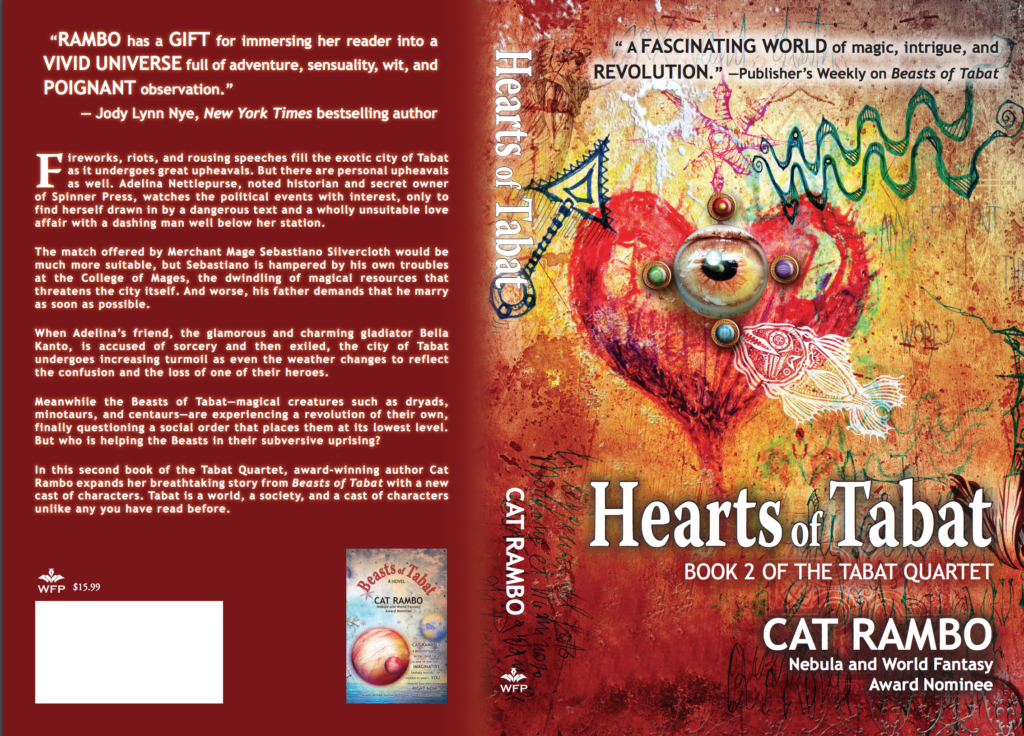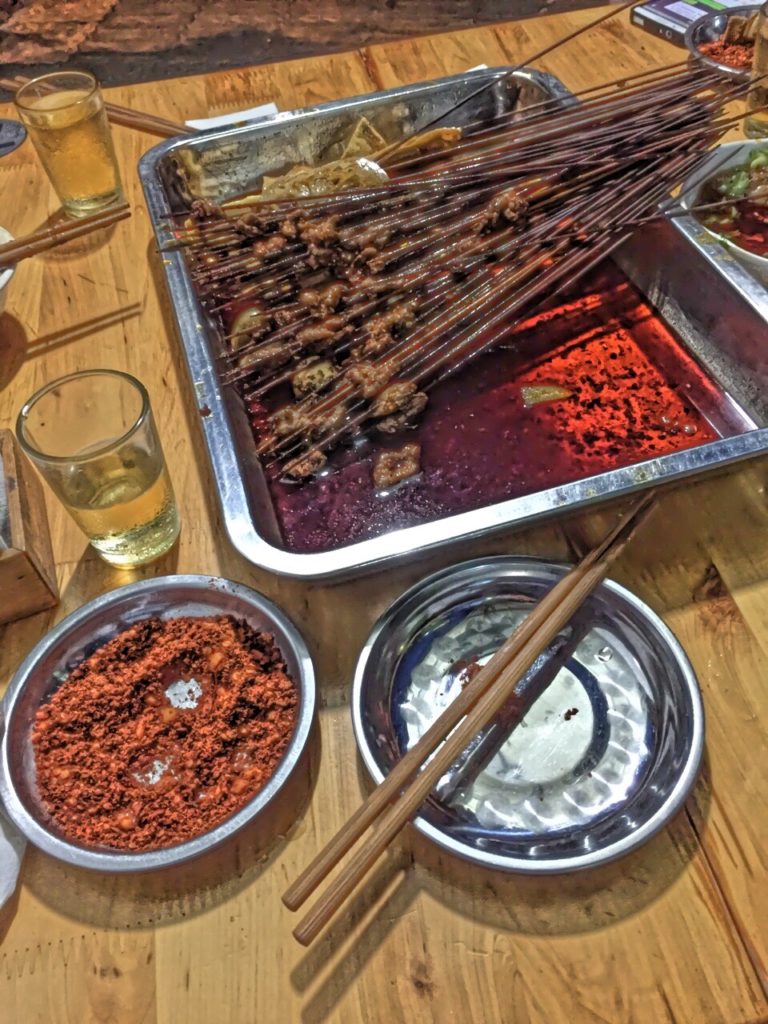Among the things I’ve done in 2017:
- In writing, I did the works listed here as well as turning Hearts of Tabat (so MANY thanks to my awesome editor, Kevin J. Anderson) into the publisher (also Kevin) and starting book #3, Exiles of Tabat, which I’ve got about 40k on so far. I didn’t publish any book-length work, but I’d had two in late 2016 (to the point where I was thinking one had come out this year) and will have at least two in 2018, so I guess it all evens out.
- Lots of new classes for the Rambo Academy, including guests like Alex Acks, Jennifer Brozek, Cassandra Khaw, Rachel Swirsky, Paul Weimer, and Fran Wilde.
- In skill acquisition, I added how to cook sous vide, coffee roasting, basic lockpicking and (even more basic) scuba to my overall character sheet. I also learned how to load and shoot a pistol, along with basic gun safety.
- In fear conquering, I swam with sharks (twice) and took a self defense class.
- In travel, I visited Orlando, New York City, Indianapolis, and Pocatello (ID) in the US and Dominical and surrounding areas in Costa Rica.

Notable highlights of SFWA-related stuff:
- The Singularity, SFWA’s electronic newsletter, an entity I kicked into existence and which Kate Baker and Terra LeMay have coaxed into blossoming, has a regular, predictable monthly schedule now, and is always full of useful and timely stuff. This newsletter has garnered consistent compliments for its friendly but professional and informative feel, and it’s provided a new way to let SFWA members know about SFWA stuff they might want to take advantage of, as well as to share their own appearances and projects with each other.
- SFWA’s excellent Executive Director Kate Baker said a few years back, “I want to make the Nebula weekend -the- premiere conference for professional F&SF writers” and I said, “Tell me what you need to do it.” This year’s Nebulas were fantastic; next year’s will be even more, including having Data Guy there to present on the industry, an effort that’s taken a couple of years to get in place.
- The SFWA Storybundle had its first year and was wildly successful, as was the Nebula-focused HumbleBundle. The Storybundle program will grow 150% in size in 2017, which sounds really impressive but just means 3 bundles instead of 2. Plus – SFWA’s Self-Publishing Committee has taken that effort over, so no work for me! (Last year I read a bajillion books for it.)
- A long, slow revamp of Emergency Medical Fund stuff driven by Jennifer Brozek, Oz Drummond, and Bud Sparhawk is coming to its final stages. I just saw the EMF stewards in action: they received an appeal, evaluated it within 24 hours, and within a week, if I am correct, funds had been disbursed. The Grants Committee just wrapped up its 2017 work; next year it’ll have even more money to play with, thanks to the aforementioned Nebula HumbleBundle.
- Over 50% of the membership participated recently in the survey that went out this year, so we have some data about who the members are and what they want. I would like to think that the high participation rate was driven in part by enthusiasm for what the organization has been doing lately, but it might have something to do with the idea to offer a chance to win one of the ten $25 Amazon gift cards we gave out for participating.
- Many of the steps talked about in this discussion of the Fireside Fiction’s report on black writers in speculative fiction and what SFWA could do have been or are being put into place. One thing I’d like to find in 2018 is a volunteer who might coordinate diversity efforts, searching for opportunities where they might dovetail in order to strengthen and inform each other as well as helping make sure we’re examining and evaluating results to see how we’re doing, etc.
I appreciate the many of you who have joined or renewed their memberships specifically because of things I’ve done; it gladdens my heart when you tell me that, but I want to stress that it’s a team effort. That’s because this year I have increasingly experienced a wonderful thing, which is that I will say, “Hey we should do X,” and someone will reply, “Already on it, here’s what’s been done and the overall action plan/timeline.” Dan Potter, Derek Kunskën, Erin M. Hartshorn, Jeffe Kennedy, Jonathan Brazee, Kate Baker, Sarah Pinsker, Steven H Silver, and Terra LeMay, among others, have all given me the precious gift of moments like this in 2017. You folks rule.
When I first came on board a few years ago, I sometimes felt like I was wandering through a morass of undone things and incipient crises. Some plates that had been in the air had fallen and shattered, sometimes disastrously. As I got them back up, it was a panicked dash from one plate to the next at times, and I know I dropped my share. But now more and more of them have their own dedicated spinner, usually with a fallback person in the background, and that lets me stop long enough to take a breath.
I’m kinda amazed I got as much done as I did in terms of writing and teaching. Certainly some words that I otherwise would have written this year got sacrificed on the SFWA altar, but I think that will be less so in 2018. *fingers crossed* (If you enjoy my stories, please consider supporting the Patreon effort; $1 a month gets you at least one story each month; double that to get weekly writing tips and resources.)
 So what’s ahead for 2018?
So what’s ahead for 2018?
- I’m editing two projects. The first is Godfall and Other Stories, a solo collection by Sandra Odell. These stories are brutal and great, and I think this is an outstanding collection, particularly after coaxing a couple more stories that will be original to the collection out of Sandra. That will come out from Hydra House in April. If you’re interested in finding out what Sandra writes in a super timely way, she has The Twelve Ways of Christmas, a collection of speculative holiday stories, available for $4.99.
- The second project, which is still taking submissions, is an anthology of political SF focused on the aftereffects of 45’s era, which will come out around the same time as the elections. It’s called If this Goes On and will appear from Parvus Press.
- I’ll be writing at least one Tericatus and The Dark story for an upcoming anthology I got a solicitation for.
- I am insanely juggling three novels and need to just buckle down and knock them off one at a time. They are, in the order I plan on doing so in 2018, The Five, a YA space opera (currently at 30k, destined to be somewhere in 70k range), the sequel to Hearts, Exiles of Tabat (Hearts was 120k, suspect Exiles will be as well, currently around 30k done), and an urban fantasy, Brazen (got 20k written, will be in 70-80k range.)
- I have enough SF stories for another collection. Maybe two. Debating whether I want to approach a small press or self-pub those. I have around 50-60 flash stories, depending on how you define flash length, that I am putting together in a book for Patreon supporters and can after that can use to accompany the Flash Fiction class.
- The Idea to Draft book is so! close to being done and I just need to get butt in gear and finish it up.
- In Rambo Academy for Wayward Writers news, both old and new live classes will be offered in 2018, including ones from Ann Leckie, Rachel Swirsky, and some of the other guest teachers. Ditto with the on-demand classes – right now I’m working on turning Writing Steampunk and Weird Western into written form. Many thanks to Jim Johnson for pointing out areas I’d overlooked; the overall class will be much stronger as a result.
- Conventions I definitely plan to be at in 2018: International Conference for the Fantastic in the Arts (ICFA), Norwescon, the Nebula weekend, Worldcon, and Snake River Comic Con.
- I do have one very large and absolutely terrifying project up in the air, getting ready to launch in 2018. It is not a creative effort but a political one. Stay tuned for info on that or drop me a line if you’ve been looking for a place to put some volunteer time/effort in 2018.












One Response